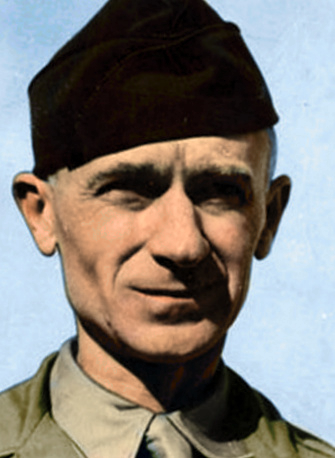The Pittsburgh Press (July 5, 1944)

Roving Reporter
By Ernie Pyle
In Normandy, France – (by wireless)
The Germans are methodical in their night air attacks on our positions in Normandy, as they are in everything else. You begin to hear the fair, faraway drone of the first bomber around 11:20 every night.
Our own planes patrol above us until darkness. It gets dusk around 11, and you are suddenly aware that the skies which have been roaring all day with our own fighters and bombers are now strangely silent. Nothing is in the air.
The ack-ack gunners, who have been loafing near their pup tents or sleeping or telling stories, now go to their guns. They bring blankets from the pup tents and pile them up against the wall of the gun pit, for the nights get very cold and they will wrap up during the long lulls in the shooting.
The gunners merely loaf in the gun pits as the dusk deepens into darkness, waiting for the first telephoned order to start shooting. They smoke a few last-minute cigarettes. Once it is dark, they can’t smoke except by draping blankets over themselves for blackout. They do smoke some that way during the night, but not much.
In four or five places in the wall of the circular pit, shelves have been dug and wooden shell boxes inserted to hold reserve shells. It is just like pigeonholes in a filing cabinet.
When the firing starts, two ammunition carriers bring new shells from a dump a few feet away up to the rim of the gun pit and hand them down to a carrier waiting below, who keeps the pigeonholes filled. The gun is constantly turning in the pit and there is always a pigeonhole of fresh shells right behind it.
The shells are as long as your arm and they weight better than 40 pounds. After each salvo the empty shell case kicks out onto the floor of the pit. These lie there until there is a lull in the firing, when the boys toss them over the rim of the pit. Next morning, they are gathered up and put in boxes for eventual shipment back to America, where they are retooled for further use.
Each gun is connected by telephone to the battery command post, in a dugout. At all times one member of each gun crew has a phone to his ear. When a plane is picked up within range, the battery commander gives a telephonic order, “Stand by!” Each gun commander shouts the order to his crew, and the boys all jump to their positions.
Everybody in the crew knows his job and does it. There is no necessity for harshness or short words on the part of the gun commander. When a plane either gets shot down or goes out of range, and there is nothing else in the vicinity the command is given, “Rest!” and the crews relax and squat or lie around on the floor of the pit, but they don’t leave the pit.
Sometimes the rest will be for only a few seconds. Other time it may last a couple of hours. In the long lulls the gunners wrap up in blankets and sleep on the floor of the pit – all except the man at the telephone.
It is the usual German pattern to have a lull from about 2:00 to 4:00 a.m., and then get in another good batch of bombing attempts in the last hour before dawn.
The nights are very short here now – from 11:00 p.m. to 5:00 a.m. – for which everybody is grateful. It actually starts breaking a faint dawn just about 4:30, but the Germans keep roaming around the sky until real daylight comes.
Our own patrol planes hit the sky at daylight and the Germans skedaddle. In the first few days, when our patrol planes had to come all the way from England, the boys tell of mornings when they could see our planes approaching from one direction and the Germans heading for home at the opposite side of the sky.
As soon as it is broad daylight and the last “Rest!” is given, the boys crank down the barrel of their gun until it is horizontal, and then take a sight through it onto the stone turret of a nearby barn – to make sure the night’s shooting hasn’t moved the gun off its position. Then some of them gather up the empty shells, others get wood fires started for heating breakfast, and others raise and tie the camouflage net.
They’re all through at 7:00 a.m., and half of the shift crawl into their pup tent beds while the other half go to work with oil, ramrod and waste cloth to clean up and readjust the gun. There will be no more shooting until darkness comes again.
